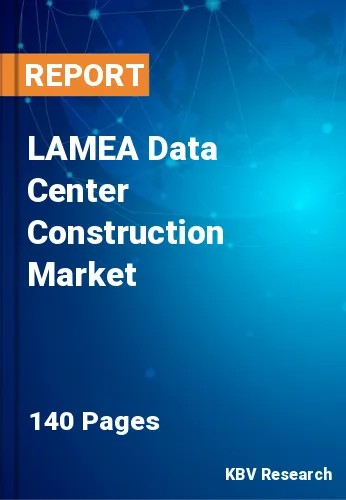The Latin America, Middle East and Africa Data Center Construction Market would witness market growth of 13.5% CAGR during the forecast period (2022-2028).
IoT (Internet of Things), intelligent computing, and AI (Artificial Intelligence) are becoming more popular in various industries and business sectors, opening up the potential for market players. As part of their initiatives to automate the economy, developing nations have made investments in data center infrastructure. As a result, several industries, including BFSI, healthcare, manufacturing, and energy, have extensively used these facilities.
Data generation has increased in recent years due to rapid digitalization implementation. Organizations can better manage the risks of disruption, such as the need to rebuild their businesses, market fluctuations, and unpredicted geopolitical events that can lead to unpredictable results, by undergoing digital transformation.
Also, switching from an outdated digital setup to a new one allows for introducing of numerous technologically sophisticated products and services. In various industries, these features allow customer service and advertising teams to create tailored experiences that strengthen client relationships. Throughout the projection period, these measures would further fuel the demand for digital transformation.
Brazil is also one of the largest healthcare sectors in Latin America, accounting for 9.1% of the country's GDP, as the International Trade Administration reported. Hence, the expansion of the data center power industry would also prosper due to the region's fast-growing healthcare sector. With cloud-based services and technologies at the forefront of this trend, technology is poised to play a significant role in African and Middle Eastern nations' work to transform their economies. For instance, in order to set up cloud data centers there, Microsoft Corporation plans to enter Middle Eastern markets like Abu Dhabi and Dubai. In addition, organizations in Latin America and the Middle East are shifting to data center solutions to satisfy their expanding data needs. Therefore, the regional data center construction market is anticipated to benefit from these variables' lucrative growth potential during the projected period.
The Brazil market dominated the LAMEA Data Center Construction Market by Country in 2021, and would continue to be a dominant market till 2028; thereby, achieving a market value of $6,879.1 million by 2028. The Argentina market is experiencing a CAGR of 14.1% during (2022 - 2028). Additionally, The UAE market would display a CAGR of 13.2% during (2022 - 2028).
Based on Tier Type, the market is segmented into Tier 3, Tier 2 and Others. Based on End-Use, the market is segmented into IT & Telecom, BFSI, Healthcare, Government & Defense, Energy and Others. Based on Type, the market is segmented into IT Infrastructure, Electrical Infrastructure and Miscellaneous Expenses & Others. Based on IT Infrastructure Type, the market is segmented into Server, Networking Equipment and Storage. Based on Electrical Infrastructure Type, the market is segmented into Cooling and Power Distribution. Based on countries, the market is segmented into Brazil, Argentina, UAE, Saudi Arabia, South Africa, Nigeria, and Rest of LAMEA.
Free Valuable Insights: The Worldwide Data Center Construction Market is Projected to reach USD 305.3 Billion by 2028, at a CAGR of 7.5%
The market research report covers the analysis of key stake holders of the market. Key companies profiled in the report include Hewlett-Packard enterprise Company (HP Development Company L.P.), IBM Corporation, ABB Ltd., Schneider Electric SE, Oracle Corporation, Cisco Systems, Inc., Vertiv Holdings Co., Huawei Technologies Co., Ltd. (Huawei Investment & Holding Co., Ltd.), Fujitsu Limited and Equinix, Inc.
By Tier Type
By End-Use
By Type
By Country
Our team of dedicated experts can provide you with attractive expansion opportunities for your business.

